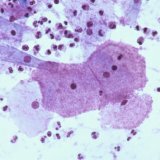Vaccination against hepatitis B in newborns and children of the first year of life
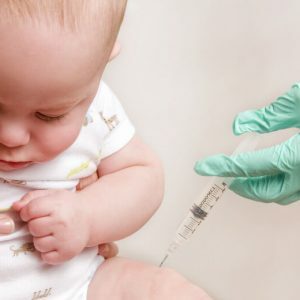 Hepatitis B is an infectious disease, the development of which is triggered by the ingress of a virus into the human body.In this disease, pathological lesions of liver cells occur, most often this process passes into the chronic form of the flow and causes the appearance of cirrhosis and / or liver cancer.Medicine knows people who carry the hepatitis B virus in the body all their life after they have had a disease once.But if a small amount of infected blood gets into the body of a healthy person, the development of an infectious disease is guaranteed.
Hepatitis B is an infectious disease, the development of which is triggered by the ingress of a virus into the human body.In this disease, pathological lesions of liver cells occur, most often this process passes into the chronic form of the flow and causes the appearance of cirrhosis and / or liver cancer.Medicine knows people who carry the hepatitis B virus in the body all their life after they have had a disease once.But if a small amount of infected blood gets into the body of a healthy person, the development of an infectious disease is guaranteed.
If a woman who carries the virus of the disease in question or a patient becomes pregnant, the pathology can be transmitted to the child during childbirth. The hepatitis B virus is cunning and dangerous, that's why the doctors put the question of mandatory vaccination against the disease even in childhood - the first inoculation is done by the baby in the maternity home, the first day after birth.
Table of contents: Vaccines that vaccinate children from hepatitis B When vaccinating children from hepatitis B Schedule of vaccination for children Possible side effectsVaccines that vaccinate children from hepatitis B
The vaccine against this disease is nothing more thanProtein with the main antigen of the virus.With the introduction of this protein, the body's immune system is put into operation-antibodies are developed within 2 weeks after vaccination, which prevents the development of hepatitis B even when the virus enters the body.Vaccines are made by genetic engineering methods, they are safe, but in some cases can cause side effects.
The following preparations are used for hepatitis B vaccination:
- Euvax.Produced by 0. 5 ml, the composition contains a preservative.This vaccine is produced in South Korea, the control of production is carried out by Aventis Paster in France.
- Engeriks B. It is produced in a disposable syringe, in which there is 1 ml of preparation, which corresponds to one dose for administration, and there is a preservative in the composition.This vaccine is produced in Belgium.
- Combirotech.Produced in ampoules of 0. 5 ml, the composition does not contain preservatives.A drug is manufactured in Russia.
In addition to these drugs, other means can be used for vaccination.
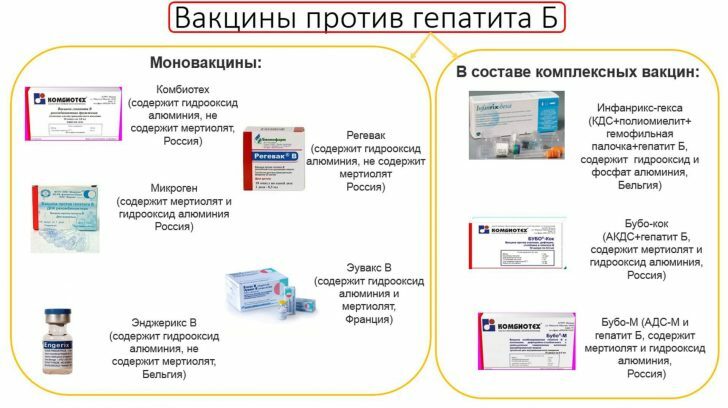
When a child is vaccinated against hepatitis B
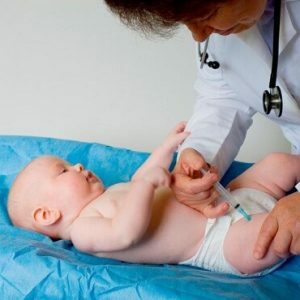 Even if the baby was born to an absolutely healthy woman, he is vaccinated on the first day after the birth of .In principle, this is an obligatory program for vaccinating children, but parents have the right to refuse specifically from this vaccination.
Even if the baby was born to an absolutely healthy woman, he is vaccinated on the first day after the birth of .In principle, this is an obligatory program for vaccinating children, but parents have the right to refuse specifically from this vaccination.
Vaccination is mandatory for newborns who are at risk.Such children will be born from a mother who has hepatitis B( a woman is ill or has an anamnesis in this third trimester of pregnancy).In addition, babies born from the mother-carrier of the Australian antigen, from the drug-addicted woman and from those who were not examined for markers of viral hepatitis for some reason were at risk.
Note: doctors conduct compulsory vaccination for newborns if their family has patients with the disease under consideration, and it does not matter in what form the B hepatitis is acute or chronic.
Schedule of vaccination for children
Vaccination against hepatitis B is included in the vaccination schedule of most countries, an injection is injected into the muscle of the hip or shoulder.
The first vaccination is given to a newborn in the first 12-24 hours after birth, and this vaccine is made before BCG.Repeated vaccination is done at the age of 1 or 3 months, the third - at six months of age. A similar vaccination schedule for hepatitis B is used only for healthy, full-term newborns that are born from healthy mothers. If the newborn is at risk, the vaccination schedule changes somewhat:
- the first vaccination - 12 hours after birth( during this time);
- second vaccination - at a month's age;
- the third vaccination - at two months of age;
- the fourth vaccination - at the age of 12 months.
Note: if the child was not vaccinated in the early childhood, he is vaccinated according to the following scheme:
- the first vaccination is done on any day that will be considered the start of vaccination;
- the second inoculation is put in a month after the first;
- the third inoculation is done 5 months after the second.
If a child is born prematurely, an individual vaccination schedule is prepared for him.
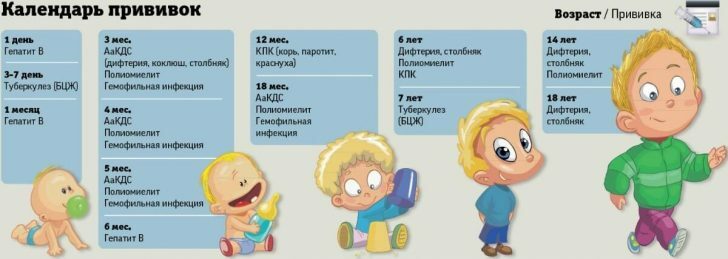
In some cases, an emergency vaccination may be necessary - for example, the child is taken to regions / countries where there is a high incidence of hepatitis B, or an injured needle was injured. And then doctors carry out the vaccination according to the accelerated schedule - three inoculations with an interval of 0 - 7 - 21 days, and revaccination is prescribed after 12 months, after the third vaccination.
The vaccine against hepatitis B is highly effective - in 90% of cases there is a stable development of immunity against the infectious disease in question. And, this effect remains for many years - even 40 years after vaccination, immunity is revealed in 65% of previously vaccinated people.Usually doctors do not check the effectiveness of vaccination against hepatitis B, but there are children for whom carrying out such a screening test is necessary.This group includes children on hemodialysis, born from a female carrier of the virus and with weakened immunity.It is not superfluous to check the effectiveness of vaccination and in the case of the drug in the gluteus muscle.The test for the effectiveness of the hepatitis B vaccine is carried out 40-60 days after the third dose, it consists in determining the titer of antibodies to the virus.High vaccination efficiency is recognized if the titer is not lower than 10 mU / ml.
There are usually no contraindications to the procedure under consideration, doctors can not vaccinate unless the vaccine is diagnosed intolerance or high sensitivity of components that make up the vaccine.
Possible side effects
As a rule, children carry the vaccination against hepatitis B, usually their behavior does not change, and the health does not deteriorate. However, doctors do not exclude the presence of side effects immediately after vaccination:
- reddening of the skin and compaction at the site of administration of the vaccine;
- slight increase in body temperature( before subfebrile indicators);
- feeling of discomfort and low intensity at the injection site.
To do or not to vaccinate against hepatitis B is a purely voluntary matter and parents can decide on their own whether or not to vaccinate.But you need to weigh the pros and cons, take into account the probability of infection with the hepatitis B virus and the risk of developing a chronic disease.Do not forget that hepatitis B under certain circumstances leads to liver cancer, so you can call the vaccination under consideration the first anti-cancer vaccine.Adverse events after the introduction of the vaccine are extremely rare and represent minimal health disorders, during the injection the child does not experience pain, but the benefits of the vaccine are really many.
Tsygankova Yana Aleksandrovna, medical reviewer, therapeutist of the highest qualification category



